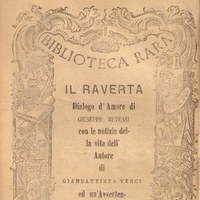Giuseppe Betussi

Giuseppe Betussi was born in Bassano del Grappa around 1512, from a notary family. After receiving an excellent classical education, he moved to Padua in 1540 where he met Sperone Speroni and joined the Accademia degli Infiammati. Around 1542 he moved to Venice where he entered into the good graces of Pietro Aretino and began his literary career by composing the Amorous Dialogue in 1543 and the Raverta in 1544. In the same year he began working first in Giolito's printing house and subsequently at Count Collatino di Collalto where he began his successful work as a popularizer of Boccaccio's works, of which he translated between 1545 and 1547 the De claris mulieribus, the De casibus virorum illustrium and the De genealogiis deorum. After a series of stays in Florence and Rome, in 1550 he moved to Milan and was welcomed by the Academy of the Phoenicians. In 1552 he was a guest in Milazzo of Countess Eleonora Falletti, to whom he dedicated the dialogue La Leonora which, however, was only published in 1557. In 1556 he wrote in Rome The Images of the Temple of Joan of Aragon and subsequently began a series of trips to Italy. France and Spain. In 1573 the Reasoning above the Cathaio was published in Padua, dedicated to the Obizzi family. After this last work there is no more news of Betussi who will probably die shortly after 1573.

 +34 954 610 124
+34 954 610 124






